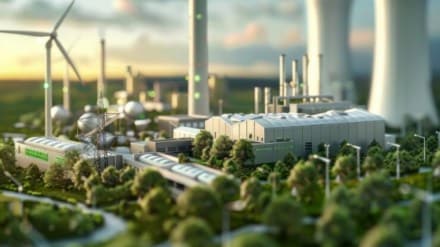By Annanya Agarwal
Transformation and innovation are a business imperative in the 21st century. We have seen several examples of businesses which have perished because of their inability to innovate and transform. The biggest innovation and transformation quest in front of business leaders today is sustainability. Globally, businesses are amping up their focus on going green and sustainable. Several strides have been made whether with Government interventions, or businesses finding true value (read cost efficiency and productivity) in sustainability.
The one industry which is silently leading the green and sustainable revolution is the manufacturing industry. Whether that is through practices, mindset, investment or workforce training, manufacturing industries in India are at the forefront of innovation and transformation in sustainability. Examples aplenty, there is a lot to be desired still. It’s a quest, a quest to not only go sustainable yourself, but your customers, supply chain, sourcing and the entire ecosystem. ‘Ecosystem’ is the keyword here as the manufacturing space is very intertwined and interdependent.
Let’s dive into why and how one can turn sustainable, profitably and impact the lives of customers, society, and the planet.
Adopting the circular economy mindset is showing dividends:
Per the European Parliamentary Research Service (EPRS), it is possible to achieve a circular economy in manufacturing by 2030. To do this, adopting disruptive business models and advanced technologies are crucial. Another aspect we need to pay attention towards is using secondary materials to secure raw materials supply and reduce import dependency and vulnerability to price volatility.
The circular model is an alternate and more sustainable model than the traditional ‘take-make-consume-throw’ erstwhile principle of manufacturing. The traditional method, which has been followed thus far results in over utilisation of natural resources, which may be cheaper but does not bring viable long-term value. What else is there in it for organizations to adopt a circular economy mindset? Cost-savings. According to the EPRS, EU companies can anticipate 12 to 23 percent of savings in their material cost. Similarly, using secondary raw materials instead of primary raw materials can result in 20-90 per cent energy savings and considerable water savings.
There are several businesses which have already made significant commitments towards sustainability and adopting circular economy principles. Unilever is a classic example. Unilever has committed to reducing its packaging waste by 25% by 2025.
Benefits are multiple, and organizations are now starting to see this, and I expect manufacturing players to lead by example when it comes to green and sustainability.
The unmatched role of technology:
Technology is at the forefront of this sustainable revolution and transformation. While the use of technology in manufacturing is not new, its application and the advanced utilisation is where there are significant strides made. As an example, today, manufacturers are using advanced AI and IoT-based systems which help enhance the resource and process scheduling within manufacturing, thereby making a significant impact on reduction in energy consumption and pollution to the environment.
Similarly, these technologies can address very critical challenges often faced in the sphere of sustainability especially in manufacturing. Technology can play a pivotal role in making data driven decisions more accurately and in less time, resulting in better output, increased productivity, and cost savings. Constantly monitoring the data received from different sensors, enables decision makers to predict, and move faster.
Last, but not the least, it is crucial to make the entire supply chain more transparent, focused on green and robust. Supply chain has been a huge bottle neck throughout the COVID-19 pandemic and while several steps are being taken to optimize, businesses should focus on sustainable efforts to make a more lasting impact.
I’d love to leave everyone with a thought – as Mahatma Gandhi had once said – “The future depends on what we do in the present.”
The author is a CEO and Co-Founder of Runaya
Disclaimer: Views expressed are personal and do not reflect the official position or policy of Financial Express Online. Reproducing this content without permission is prohibited.
